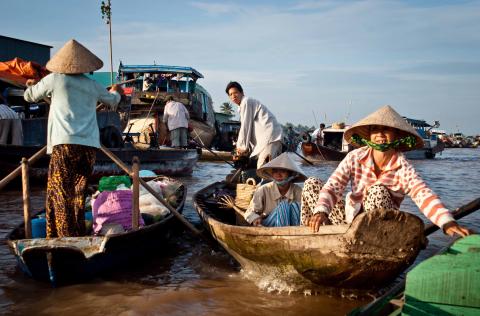Can Tho, Vietnam - Deployment of the CityStrength Diagnostic

Vietnamese persons during the Floating Market in Can Tho, Vietnam. Cai Rang Market is the most important floating market on the Mekong Delta. © Shutterstock
With a population of 1.25 million, Can Tho is the largest city in the Mekong Delta and the fourth largest city in Vietnam. Can Tho City has been ranked since 2009 as a first-class city, putting it under the direct management of the central government. Geographically, Can Tho holds a key position in Vietnam and in the wider Mekong Delta Region — a region that has huge economic potential but at the same time is highly vulnerable to a number of shocks and stresses.
Can Tho is dealing with chronic seasonal flooding, periodic flood disasters, riverbank erosion, saltwater intrusion, possible land subsidence, economic transition, and rapid urbanization. The city is also aware of challenges that lay on the horizon like sea level rise, a labor force that is unprepared for high-technology industry and an urban population that expects high-quality urban infrastructure and services from its government. These challenges are interlinked—encroachment on canals and riverbanks increases flood risk, while flooding and rampant growth impact the safety and quality of life in urban areas.
“We need to ensure that we address the threats to our future success. We need to take proactive measures to deal with recurrent flooding, the pressures of rapid urbanization and the anticipated impacts of climate change to ensure that we reap the benefits of economic growth in a safe, sustainable, and inclusive way. In short, we need to become more resilient. This will be a long-term journey, and the implementation of the World Bank’s CityStrength Diagnostic represents just one milestone.”
- Mr. Le Hung Dung, Chairman, Can Tho City People’s Committee
Priority areas for intervention
Can Tho can address the two primary threats to its socio-economic development goals—flooding and uncontrolled urbanization—by more proactively guiding urban growth to areas with lower flood risk, including the higher-elevation areas near the heart of the city.
The following actions and investments could have a transformational impact on the resilience of the city as a collection of initiatives implemented by Can Tho with more effectively coordinated support from development partners.
Priority actions include:
- Strengthen institutional capacity and legislative frameworks for an effective, integrated flood risk management approach.
- Enhance the collection, sharing and use of data on public assets, buildings, population, and risks.
- Improve the analysis of climate impacts in Can Tho by introducing standardized damage and loss assessment procedures that will enable local officials to quantify the impact of flooding on the local economy and budget.
- Strengthen financial management to enhance the sustainability of infrastructure investments and strengthen capital investment planning to facilitate better prioritization, monitoring and achievement of economic development goals.
Priority investments include:
- Focus on implementing flood protection measures in the urban core to make it a more attractive and safe place to live and do business.
- Use transport investments to guide urban growth to higher elevation areas and meet the needs of a modernizing city.
- Invest in sanitation to protect public health and support the economic base of the city.
- Continue to focus on urban upgrading as a means of addressing encroachment on drainage canals and targeting support to poor and vulnerable groups in the city.
The World Bank’s CityStrength Diagnostic methodology was implemented to identify priorities for enhanced resilience in Can Tho.
The CityStrength Diagnostic facilitates a dialogue among stakeholders about risks in their city and the performance of urban systems. It helps identify priority actions and investments that will enhance the city’s resilience as well as increase the resilience-building potential of planned and aspirational projects. CityStrength was conducted in Can Tho, Vietnam in June 2014 at the request of the city.
For the exercise in Can Tho, a team of World Bank specialists in collaboration with local officials identified seven priority sectors/cross-cutting thematic areas to cover in the diagnostic, including urban development, disaster risk management and climate change adaptation, community and social protection, municipal finance, transport, energy, and water and sanitation.
CityStrength implementation in Can Tho consisted of five stages:
- A pre-diagnostic review was carried out prior to the visit in June to collect information and leverage efforts that have already been undertaken in the city. As part of this, a review was conducted of all relevant studies, reports and plans developed by the city, the World Bank and other development partners to identify key risks and trends and get an overview of the performance of the different sectors.
- A launch workshop with key stakeholders in Can Tho helped validate and complement the findings of the pre-diagnostic review, created a shared understanding of urban resilience and provided an opportunity to learn more about the city’s goals and objectives.
- Following the workshop, interviews with key city stakeholders were carried out in combination with site visits across the city to better understand the challenges and opportunities, and to qualitatively assess the performance of different urban systems.
- Based on the findings, urban stakeholders and the World Bank team identified priority cross-sectoral actions and investments that could help Can Tho enhance its overall resilience.
- The recommendations were discussed with the Chairman and Vice-Chairwoman of the Can Tho City People’s Committee, and compiled in a report that the city can take forward in collaboration with the World Bank and other development partners.
Plans and investments
The World Bank is currently implementing a $250 million project on urban resilience. Furthermore, the CityStrength Diagnostic informed an open data initiative and a study of logistics and the role of Can Tho in the regional economy.
To read the full report with the outcomes of the exercise, please click here.
For more information on CityStrength, please visit: www.worldbank.org/citystrength
